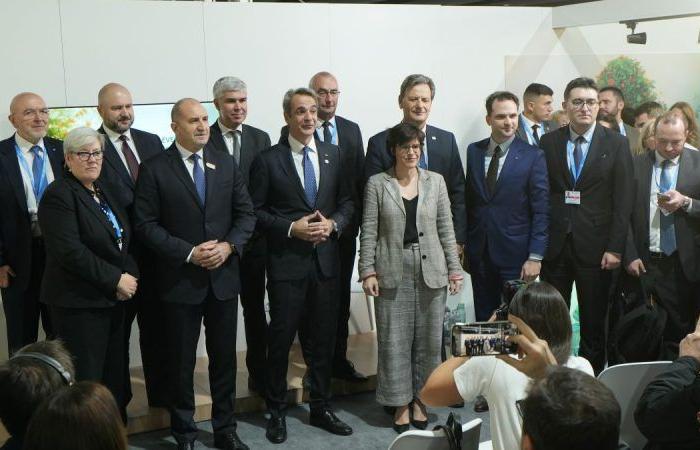A Bulgarian-led initiative to lower electricity prices by improving energy interconnection in the south-eastern European region was supported by eight countries on Wednesday 13 November at COP29 which took place is held in Baku.
The project was announced by Bulgarian Energy Minister Vladimir Malinov in the presence of Bulgarian President Rumen Radev and Greek Prime Minister Kyriákos Mitsotakis.
The event took place at the Bulgarian Pavilion of COP29 in Baku.
Vladimir Malinov affirmed that the exchange of knowledge between regional partners is “one of the key factors” to develop electrical systems capable of meeting “the modern challenges of integrating renewable energies”.
Improving existing energy connections will allow clean and cheap energy from northern European wind farms to reach lower latitudes, the minister explains, adding that improving energy connections will also allow transport clean energy from Egypt to Central Europe.
The non-paper presented by the Bulgarian minister received the support of the energy ministers of Greece, Romania, the Czech Republic, Italy, Belgium and Hungary — which holds the rotating presidency of the Council of the European Union (EU) — as well as Moldova and Azerbaijan — host country of COP29.
“Through this informal document, you have raised an essential question”says Romanian Energy Minister Sebastian Burduja.
“We are all on the same side, on the same team. You don’t have to look far. Just look at the energy price map today. I am particularly in solidarity with Hungary, which is the European champion of high prices,” he adds.
The recent rise in electricity prices in southeastern Europe has prompted a call for action from countries in the region.
Next meeting in Sofia
“Our vision is to organize a series of structured technical and political dialogues […] over the next few months »says Vladimir Malinov, adding that a meeting next February in Sofia will define the scope of the dialogue and identify areas in which the initiative can be continued.
“For Hungary, the Bulgarian initiative is very important, because it symbolizes the construction of connectivity between our countries”estimates Hungarian State Secretary for Security Policy and Energy Security, Peter Sztaray.
In this regard, he drew attention to one of the important initiatives in which Hungary participates and which Bulgaria has joined: the green energy corridor, which until now brought together Azerbaijan, Romania, Georgia and Hungary.
“This is a very important project, as it connects Central and Eastern Europe to the Caucasus region and perhaps later to Central Asia. We must implement it, otherwise we will not survive. But if we want to survive and have energy security, we must cooperate”affirme Peter Sztaray.
Victor Parlicov, Moldova’s Energy Minister, who was also present at the launch, stressed that his country’s goal was to become part of the European energy market before joining the EU.
He recalled the energy supply problems caused by the war in Ukraine.
“Today, the country needs to import electricity in the same proportions as it exported before the war”he declared. Earlier today, the energy ministers of Bulgaria and Moldova signed a memorandum on energy cooperation and mutual assistance.
In October, twelve EU member states had already asked the European Commission to support the creation of cross-border energy links, in particular electricity interconnections, in order to reduce energy prices in the EU.
[Édité par Anna Martino]






